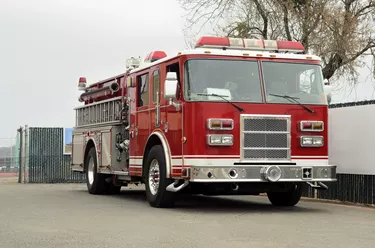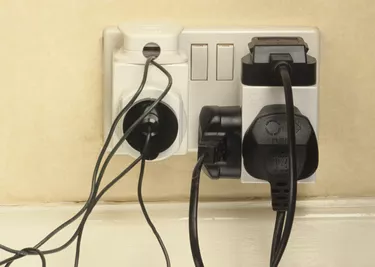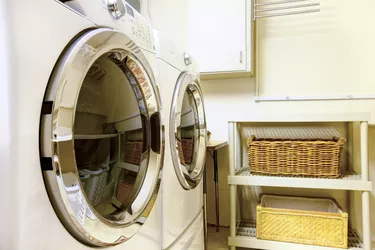
Fire hazards inside the home, outdoors and at work put people and property at risk. Improper storage, maintenance and use of everyday items increase the risk of fire. Fire prevention is essential. Reduce the risk of fire with your choice of building materials and landscape design, and by following fire safety recommendations for the home and office.
Electrical Hazards
Video of the Day

Overloaded electrical outlets and extension cords often cause fires in the home and workplace. Frayed electrical cords also present a risk. Electric space heaters cause fires from overuse and when they are placed near combustible materials. Microwave ovens need ample ventilation to prevent overheating. Light fixtures can ignite when the wattage of the light bulb exceeds manufacturer's recommendations, or when the wrong type of bulb is used. Any appliance or electronic item that is not working properly may also be a fire risk -- unplug it until it is repaired or replaced.
Video of the Day
Combustible Materials Indoors

A match in the hands of a child is a deadly fire hazard. Other hazards include household clutter, burning cigarettes and the wearing of loose-fitting clothes when cooking over an open flame. According to Thomas McMurchie, former District Chief of the Apple Valley, Minnesota Fire Department, clutter not only fuels a fire, it also keeps firefighters from gaining access to where they can extinguish the flames. Certain types of clutter -- such as paper, boxes and old clothing -- coupled with the flammable liquids often stored in garages can make a fire burn hotter and faster. Newspaper stored in a warm, damp environment can spontaneously ignite. Live Christmas trees also present an extreme fire hazard.
Combustible Materials Outdoors

Dry, flammable vegetation can easily ignite with a single spark from a lawn mower or powered landscaping equipment. Some states, such as California, require a defensible cleared space around structures on private grass and timber-covered lands. Maintaining a clean and green area is a crucial defense in areas prone to wildfires. Some roofing materials, such as wood shakes, are flammable and are prohibited in urban centers and some fire-prone suburban areas.
Flammable Liquids

Cleaning fluids, paints, varnishes, stains, paint thinners and removers, gasoline, oil and aerosols are examples of hazardous flammable liquids. Store gasoline in an outbuilding away from the home. Never use gasoline to light a barbecue. Oily rags -- including cloths that have been used to clean up oil spills in the kitchen -- are flammable. Keep them away from open flames, pilot lights and the clothes dryer. Oily rags that have been washed may still contain enough oil to ignite in the dryer. Store oil-soaked materials in a labeled and sealed metal container. Aerosol cans are very dangerous if used near any source of flame, including pilot lights, candles, fireplaces and cigarettes.
Hidden Dangers

A buildup of dryer lint in the clothes dryer and exhaust line is a fire hazard. Clean the lint trap before each use and keep the exhaust line clean as well. Lighting fixtures in a storage closet become a danger when items are stacked or stored too close to the light. The light does not have to come into contact with combustible materials to cause ignition. An electric blanket can overheat and ignite if it is tucked under the mattress or when compressed by something heavy. Damp charcoal also can ignite, so keep it in a cool, dry place. Store it in a metal container with a lid.